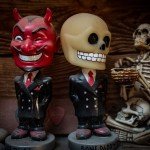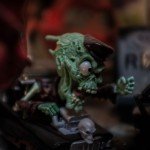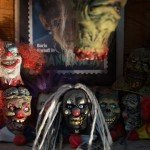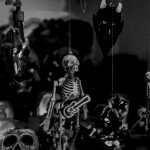+ By Leigh Glenn + Photos by Joe Karr
If you make the charts, the girls will tear you apart.
– Chris Hillman and Roger McGuinn, “So You Want to be a Rock ’n’ Roll Star”
For young Dean Rosenthal, music was about impressing girls. But for the veteran Annapolis blues guitarist today, it’s about having and sharing fun. That sensibility was inescapable when Rosenthal, 58, and his many musician friends took to the Rams Head stage last May to celebrate his 40 years of performing.
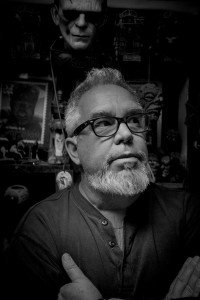 Rosenthal has always strummed to the tune of a different guitarist. Growing up in Edgewater in the late 1960s and early 1970s, he was youngest in a family whose musical tastes straddled different eras. His father, Donald, a stern World War II vet who survived three aircraft carrier sinkings in the Pacific, liked big bands, bluegrass, and jazz drummer Gene Krupa. Rosenthal’s older sister, Gail, was a fan of Elvis and Motown and turned her brother on to psychedelic rock and the band Cream.
Rosenthal has always strummed to the tune of a different guitarist. Growing up in Edgewater in the late 1960s and early 1970s, he was youngest in a family whose musical tastes straddled different eras. His father, Donald, a stern World War II vet who survived three aircraft carrier sinkings in the Pacific, liked big bands, bluegrass, and jazz drummer Gene Krupa. Rosenthal’s older sister, Gail, was a fan of Elvis and Motown and turned her brother on to psychedelic rock and the band Cream.
Though Rosenthal revered Eric Clapton, he believed he could play more like Cream bassist Jack Bruce, so he joined one other classmate in playing bass. All the other kids played acoustic guitar.
Rosenthal was 12 or 13 when he first heard Bob Dylan. “I didn’t know that Dylan was this prolific writer,” he says. “I thought the songs were funny. I was always attracted to people like Joe Cocker and Leon Russell—who didn’t have this sweet ‘la-la-la’ voice. I love the way Dylan sings.” After discovering Dylan, he switched to the old Stella guitar his grandmother had given him, added a harmonica, and got a Dylan songbook.
Rather than mimicking musicians like Clapton and English bluesman John Mayall, Rosenthal dug into their inspirations—Muddy Waters, Howlin’ Wolf, Robert Johnson. He spent hours listening to music at a used record store off Chinquapin Round Road. He added roots guitarist Ry Cooder and swamp blues player Slim Harpo to his ever-growing musical pantheon.
 The offbeat—the unconventional—was Rosenthal’s inner compass. When others were playing “Jumpin’ Jack Flash,” he was playing Johnny Cash. He recalls Southern High School music teacher and jazz trombonist Bill Taylor encouraging him: “He was a really big guy to say, ‘You’ve got something. You’re not hearing it the way everybody else is hearing it. You should stay with this.’” And he did.
The offbeat—the unconventional—was Rosenthal’s inner compass. When others were playing “Jumpin’ Jack Flash,” he was playing Johnny Cash. He recalls Southern High School music teacher and jazz trombonist Bill Taylor encouraging him: “He was a really big guy to say, ‘You’ve got something. You’re not hearing it the way everybody else is hearing it. You should stay with this.’” And he did.
As bluegrass began to mingle with mainstream music in the 1970s—with Old and in the Way, Nitty Gritty Dirt Band, the Grateful Dead, and The Band—Rosenthal joined a bluegrass band that played to every clique in school, in fields and parking lots, acoustically, with no amplification.
Ain’t the way to have fun, son.
– Randy Newman,
“Mama Told Me Not to Come”
“Take up a trade,” Rosenthal’s parents told him. They disagreed with him about a lot of things, from the war in Vietnam to his taste in music. Even though he also loved bluegrass, Rosenthal’s father couldn’t fathom what his son was listening to—except when he heard a drummer with whom he could connect; Ginger Baker, for example, knew what he was doing, but Jimi Hendrix, wailing on “The Star-Spangled Banner,” was pure sacrilege.
Rosenthal was just 15 when his father died, so he never got to play for or have an adult conversation with him. However, they had bonded over bluegrass and comedies. His father had always pointed out things—like Chico Marx doing something odd on the piano—and why they were funny. Rosenthal’s love for music and humor is reflected in his deep respect for groundbreaking songwriters and musicians who excelled at satire: Dylan, Tom Waits, Randy Newman, Warren Zevon, and Frank Zappa.
Between Bill Taylor, the record store, and the progressive rock radio station WHFS—which played new and relatively unknown old songs—Rosenthal became schooled in music. At 16, he received a nylon-stringed Yamaha guitar from his Aunt Chuckie; it was a perfect learning instrument. After high school, he had day jobs—at a greenhouse, the airport, doing carpentry—and played music at night. He stuck to that schedule for about 10 years, but it became too much. One day, when his bosses said something that set him off, he quit.
How does it feel . . .
to be on your own?
– Bob Dylan, “Like a Rolling Stone”
 Rosenthal’s longest-running musical love is the blues. “There’s something about the beat, the way it feels, the rawness of it, sometimes the humor behind it, and you can amuse yourself by playing it. It’s such a narrow format, this little box, but inside that box, it goes in all different directions. You can go anywhere—sad, happy, real, fantasy.”
Rosenthal’s longest-running musical love is the blues. “There’s something about the beat, the way it feels, the rawness of it, sometimes the humor behind it, and you can amuse yourself by playing it. It’s such a narrow format, this little box, but inside that box, it goes in all different directions. You can go anywhere—sad, happy, real, fantasy.”
But venue owners and managers weren’t as enamored of the blues as he was. A typical call to inquire about gigs:
“What kind of music do you play?”
“Blues.”
“Oh.” Deflation in the voice. “It’s that sad music. We had somebody play blues—it’s that sad song about a woman.”
He’d give it a couple weeks, and call back, taking a different approach:
“What kind of music do you play?”
“American roots.”
“What’s that?”
“Blues.”
“Oh, I love blues.”
Often, the night jobs were not in Annapolis. In Baltimore, at his first real gig, he opened for “Robert Junior” Lockwood, Robert Johnson’s quasi-stepson. As word got out, Annapolis club owners began to book Rosenthal. His persistence paid off. “I’ve made a career out of playing music people don’t want to hear.” He chuckles.
Seeking all that’s still unsung.
– Robert Hunter, “Attics of My Life”
Rosenthal is ever humble about his talents, even about who he is. He’ll say, for example, that he can play the guitar, “but Bryan Ewald is a guitar player.” And you might see him helping others, as he did at the Annapolis Fringe Festival in September, setting up the sound system for the Sestraluna belly dancers.
In his forties, after suffering two heart attacks, his humility made his life challenging. He needed a lot—financially and emotionally. His friends implored him to let them have a benefit. Finally, prompted by his mother, Ricki, who died around the same time, he relented. He was overwhelmed by what followed. “I didn’t think I was that loved. It was a combination of being at your high school reunion, wedding, and funeral all at the same time. People were genuinely there for me.”
To recover from the outpouring, Rosenthal turned his attention to projects that he had been putting off, including South County Dirt, a CD of original compilations that integrate local places and stories. At Hudson Street Sound studio with Noel White at the board, he painted a broad musical canvas. Hence the eerie sounds on songs like “Governor’s Bridge Road,” which is perfect for Rosenthal, who also loves horror.
He also enjoyed helping produce a recording for Tex Callens, bringing together musicians to layer Callens’ takes on classic country tunes and a few originals. His next project is pulling together a recording of the 40th anniversary show in time for the holidays.
 With the offbeat as his inner compass, Rosenthal’s mode of transport is his ears. He never learned to read music; he just picks up tunes by listening and plays them his way. He expects his fellow musicians, with a feel for the song and the key, to do the same. He loves every opportunity to play with them: bassist Rurik Reshetiloff, keyboardist Jimmy Jacobs, Tom Fridrich on amped tambourine, Gary Wright on mandolin and guitar, drummer Andy Hamburger, bassist Jay Turner, and others. Depending on the size of the band, Rosenthal calls it Three-Piece Racket, Four-Piece Racket, or however-many-Piece Racket.
With the offbeat as his inner compass, Rosenthal’s mode of transport is his ears. He never learned to read music; he just picks up tunes by listening and plays them his way. He expects his fellow musicians, with a feel for the song and the key, to do the same. He loves every opportunity to play with them: bassist Rurik Reshetiloff, keyboardist Jimmy Jacobs, Tom Fridrich on amped tambourine, Gary Wright on mandolin and guitar, drummer Andy Hamburger, bassist Jay Turner, and others. Depending on the size of the band, Rosenthal calls it Three-Piece Racket, Four-Piece Racket, or however-many-Piece Racket.
Rosenthal likes witnessing the current, deeper appreciation for live music and local art. Many local artists are his friends, and he likes what they’re doing, whether they are painters, guitar-drummers, or all of those, rolled into one. There’s always been a local undercurrent of offbeat arts—from the blues to Beatnik—he says, and he thinks that there could be even more support for them, including airtime for local musicians and news about who’s playing where and when.
Nowadays, Rosenthal likens himself to Jerry Jeff Walker’s Mr. Bojangles: he used to be on the receiving end of stories told by his elders; today he is the elder, spinning narratives. For young musicians, he suggests something from his back pages: listen to the originators’ music and play something you like. “It may not be for the masses, but people will come to you.” █





